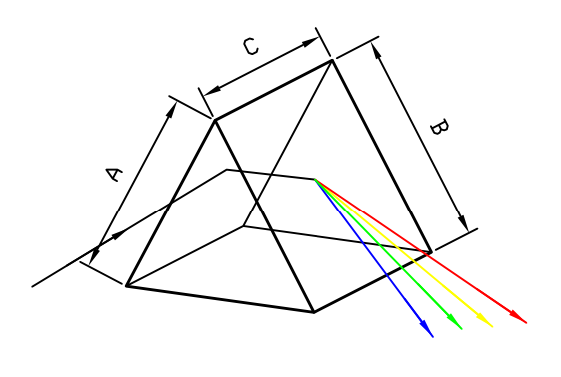Dispersion-Compensating Prism


Features:
•Apex Angle Tolerance: ±15 arcmin
•Surface Flatness: λ/4 at 633 nm
•Use to Compensate for Dispersion
•Fabricated from CaF2, Fused Silica, SF10, or N-SF14
These Dispersion-Compensating Prism Pairs are designed to compensate for the pulse broadening effects that occur in ultrafast laser systems without introducing significant power losses. Four large-index-of-refraction prism materials are offered to provide various group velocity dispersion (GVD) values, thereby compensating for different pulse dispersion conditions.
Applications:
Prism pairs such as these have multiple applications. They can be used to create an optical filter; simply insert a knife edge to attenuate the short- or long-wavelength components. If the prism pair is placed inside a laser resonator, they can be used for wavelength tuning. Alternatively, prism pairs can be used for dispersion compensation. Each time light passes through the optical elements within a laser cavity, positive (commonly referred to as normal) dispersion occurs. The prism pair also contributes positive dispersion.
Specifications:
|
Item
|
Fused Silica
|
SF10
|
SF14
|
CaF2
|
|
Wavelength
|
185-2100nm
|
380-2400nm
|
365-2400nm
|
1800-8000nm
|
|
Dimension Tolerance
|
+0.0,-0.1mm
|
|||
|
Angle Tolerance
|
3 arc min(Standard) / 10 arc sce(High Precision)
|
|||
|
Clear Aperture
|
>85%
|
|||
|
Surface Quality
|
60/40(Standard)/ 20/10(High Precision)
|
|||
|
Flatness
|
λ/ 4(Standard) / λ/10(High Precision)per 25mm@633nm
|
|||
|
Chamfer
|
<0.25mm*45°
|
|||
|
Coating
|
Uncoated
|
|||
Standard:
|
Part No
|
Material
|
A
|
B
|
C
|
Angele(°)
|
|
Fused Silica
|
15.0
|
15.0
|
10.0
|
69.0
|
|
|
DSP-SF10
|
SF10
|
15.0
|
15.0
|
10.0
|
60.6
|
|
DSP-SF14
|
SF14
|
15.0
|
15.0
|
10.0
|
59.6
|
|
DSP-CaF
|
CaF2
|
15.0
|
15.0
|
10.0
|
69.9
|
